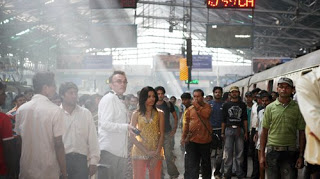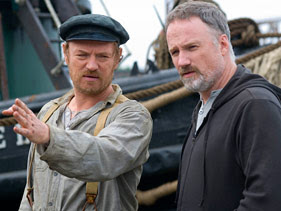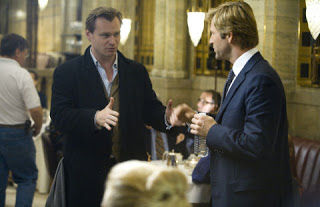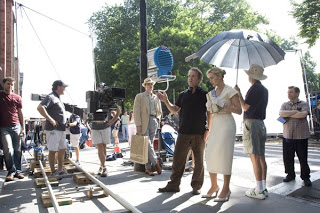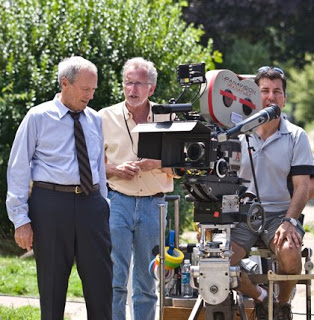NOMINEES
Danny Boyle – Slumdog Millionaire
Stephen Daldry – The Reader
David Fincher – The Curious Case of Benjamin Button
Ron Howard – Frost/Nixon
Gus Van Sant – Milk
WILL WIN
One of the more nebulous categories at the Oscars – ask the question “So, what does a director actually do?” to 10 different voters, and you’ll probably get at least eight different answers – is also one of the more intriguing. I like the Best Director race not on its own terms but because it provides insight into the Best Picture race. Unlike most races that are determined by tallying votes – political elections, MVP voting, etc. – we never learn the precise tabulation of votes cast for the Oscars. On the surface, it’s impossible to tell whether American Beauty earned a greater margin of victory in winning Best Picture in 1999 than Gladiator did a year later.
A true Oscar powerhouse, however, always wins both categories; conversely, if there’s a split, it’s safe to say that the Best Picture race was a close one. To wit, there have been four winners of Best Director in the past 10 years whose movies haven’t taken the top prize: Steven Spielberg for Saving Private Ryan (the movie lost to Shakespeare in Love), Steven Soderbergh for Traffic (movie lost to Gladiator), Roman Polanski for The Pianist (movie lost to Chicago), and Ang Lee for Brokeback Mountain (movie inexplicably lost to Crash). Gladiator was locked in a 50-50 duel with Traffic, so the split there made sense, while the Best Picture victories of both Shakespeare in Love and Crash were considered “Giants 17, Patriots 14” level shocks. The only one that doesn’t really fit is statutory rapist Polanski winning over Rob Marshall for Chicago, since Chicago was the clear Best Picture favorite, but it’s possible Marshall split votes with Martin Scorsese in the directorial race.
Predicting the winner of Best Director, therefore, isn’t so much a matter of determining which filmmaker did a superior job in supervising his film but estimating the relative level of dominance of the likely Best Picture victor. If there’s a top dog for the top prize, one can feel confident picking its director. If the race is more muddled, intrepid prognosticators have cause to predict a split.
The only situation where that logic doesn’t apply is when the likely Best Picture winner is a small-scale, intimate movie that doesn’t qualify as a showcase for a director’s talents. Past examples include the character-driven Chariots of Fire (lost to Warren Beatty for the far more ambitious Reds for Best Director) and the syrupy Driving Miss Daisy (which was so bland that its director wasn’t even nominated).
So, in forecasting the Best Director race, we have to ask ourselves two questions. Is there a consensus frontrunner for Best Picture, and if so, does that frontrunner highlight its director’s capabilities in any way?
Conveniently enough, the answers this year are “yes” and “yes”. Danny Boyle’s Slumdog Millionaire has achieved leviathan status at this point – anyone who isn’t pegging it to win Best Picture isn’t some canny insider with a secret scoop, he’s just being obnoxious. And the movie itself is staged with verve and alacrity, rushing into gritty locations and hurtling back and forth through time. It is not only a great, crowd-pleasing movie but the product of a director’s vision.
Is there a potential challenger? Certainly not Ron Howard, who already has an Oscar for a better movie than Frost/Nixon, or Gus Van Sant, whose Milk generally conforms to the standard biopic track. Stephen Daldry has Harvey Weinstein in his corner, but the rabid producer has likely been focusing his promotional efforts on Kate Winslet.
The only halfway-legitimate competitor would be David Fincher for The Curious Case of Benjamin Button, since its elegance and clarity are so startling, but Fincher hasn’t sniffed a trophy since the National Board of Review recognized him back in the first week of December. There’s no debate: In his first movie since Trainspotting, Danny Boyle takes home the Oscar.
SHOULD WIN
Not wanting to fall into the same trap as the Academy, whose voters for the most part fail to distinguish between the quality of a motion picture and its director (how else to explain how all five Best Picture nominees also earned nods for their directors?), I try to follow a specific set of criteria when selecting my own preference for the category. This remains entirely subjective, of course, and never having directed a movie and generally ignorant about the process, I have minimal personal experience from which to draw. But I like movies in which filmmakers exhibit strong formal command of the cinematic language without straying into self-indulgent pretension. Put another way, I admire directors whose movies are impressive without overtly trying to be so impressive. (Last year, for instance, I preferred Tony Gilroy’s quiet mastery in Michael Clayton to Paul Thomas Anderson’s handiwork in There Will Be Blood because Anderson’s direction, for all its striking flourishes, was also extravagant and attention-seeking.)
This year, three of the nominated filmmakers employ rather unassuming approaches to their craft. (Again, this is perfectly fine in that it suits their respective movies, but it also strikes me as less worthy of this particular Oscar.) Gus Van Sant, recognizing the extraordinary talent of his actors, lets them supply the power in Milk, generally keeping his camera straight and his aim true. It’s in fact quite a relief that Van Sant submerges his natural tendency for ostentation (on display in most of his recent movies, such as the critically acclaimed yet reprehensible Elephant), as any grandstanding on his part could have drowned Milk under the weight of its own artistry. So while I’m not selecting him as my choice for Best Director, I’m nevertheless appreciative that he showed some fucking humility for once.
Stephen Daldry could have taken a few more risks with The Reader, but given that his movie begins to strain once it starts clumsily integrating flash-forwards, perhaps he was wise to remain in the background. Ron Howard does a great job building tension with Frost/Nixon – the film’s intensity is amazing and the editing is top-notch – but when it comes down to it, he’s really just letting two guys talk. Right decision? Absolutely. Deserving of an Oscar? Not so much.
Danny Boyle may have finally established himself as an A-list director in making Slumdog Millionaire, even if he already showcased his frenzied talent 12 years ago with the fantastically compelling Trainspotting. (Shallow Grave, his debut feature, remains a paradigmatic thriller that I dearly hope receives further exposure as a result of Slumdog Millionaire’s success.) Never fearful of moving the camera, he pushes his movie forward at a breakneck pace, such as in an exhilarating early scene in which his child protagonists dart through the teeming alleyways of Mumbai. It’s a wonderfully intrusive style, thrusting us into the heart of a city and exposing us to its aroma and cultural flavor.
It is also very, very busy. That isn’t a bad thing – I like active films, especially those with such clarity of purpose and strength of character as Slumdog Millionaire. But the rush of sound and fury is overwhelming at times, and certain scenes need to be watched multiple times in order to be properly appreciated. Given how great a movie Slumdog Millionaire is, that hardly qualifies as a problem, but occasionally Boyle’s freneticism is less digestible than desired.
With its deliberate pacing and long runtime, The Curious Case of Benjamin Button is quite the opposite of frenetic. Yet under David Fincher’s direction, it is not slow but instead highly engrossing and oddly soothing. The film’s subject matter is an obvious departure from Fincher’s past – he has always been more fascinated by villainy and action than heroism and romance – but its ruthless attention to detail remains in accordance with his past pictures. The relentless brutality on display in Se7en is matched by the exactitude of its plotting and the unforgiving look of its palette, while Zodiac functions as a reflective portrait of an obsessive man searching for both truth and self. In a sense then, Benjamin Button, with its reliance on visual proficiency and its sweeping saga of a storyline, represents a perfectly logical entry into the Fincher canon.
Yet he has never made a movie like it. Beautiful, tender, and stunningly sad, The Curious Case of Benjamin Button is truly epic, a poignant elegy tinged with humor but eventually overcome with loss and regret. Fincher’s technique, however, has never been sharper. More importantly, he does not call attention to his own talent, simply because he has no need to – his mastery of the art form is evident in every tracking shot, every delicate frame, every computer-assisted effect. The movie may be long, but it has been so painstakingly produced that it attains a sort of self-fulfilling sense of purpose – everything on screen has been created with such craft that nothing could possibly serve as a throwaway.
Make no mistake: I think Slumdog Millionaire is the superior film to The Curious Case of Benjamin Button. But as far as the men behind the camera go, David Fincher gets my vote for Best Director.
DESERVING
Christopher Nolan – The Dark Knight. This one hurts. Christopher Nolan may never top Memento as an all-around tour de force, but the vision he exhibits in The Dark Knight is simply extraordinary. At once an action spectacle and a morality play, the movie provides such a breathless, unforgettable filmgoing experience that watching it seems to qualify as a life event. Nolan, utilizing precise cinematography and a haunting score, ratchets up the intensity in the very first scene and then just doesn’t stop. That the Academy failed to recognize his blockbuster as an artistic achievement is criminal.
Sam Mendes – Revolutionary Road. Like Nolan, Mendes is a methodical Brit who may never match an early feature in his career (in his case, American Beauty, unbelievably his first film), but that hasn’t stopped him from trying. Revolutionary Road doesn’t inspire the emotional trauma in audiences that it unleashes upon its characters, but it is nevertheless a beautifully constructed, haunting film. Mendes introduces claustrophobia and panic into each intimate conversation, turning an idyllic setting into an unyielding nightmare.
Clint Eastwood – Gran Torino. There’s something comforting about confirming that this wizened old-timer is still a master of his craft. Unlike some of his more recent films (including the very good Changeling), Gran Torino is taut and focused, examining the lives of a very few characters in a ramshackle neighborhood of Detroit. It may be melodramatic, but it is also touching and lyrical.
Jeremy Beck is the editor-in-chief of MovieManifesto. He watches more movies and television than he probably should.

